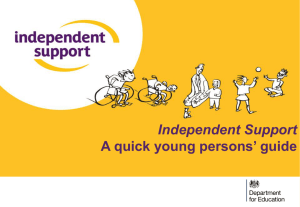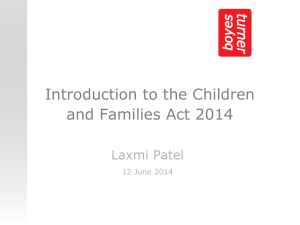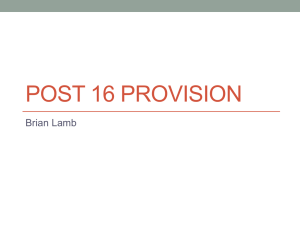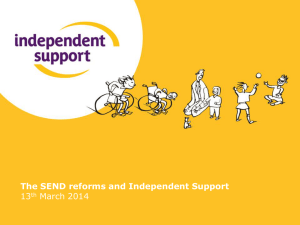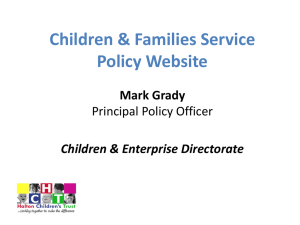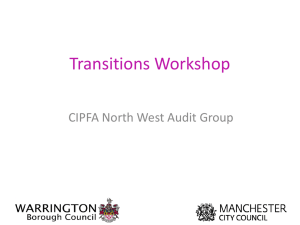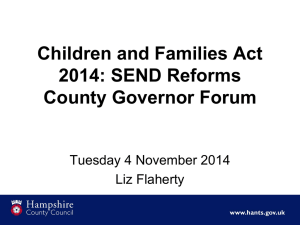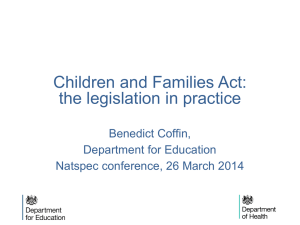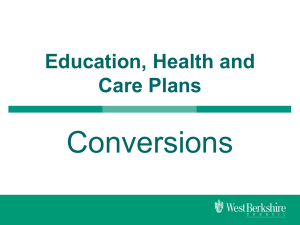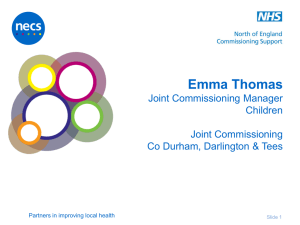- Halton Children`s Trust
advertisement
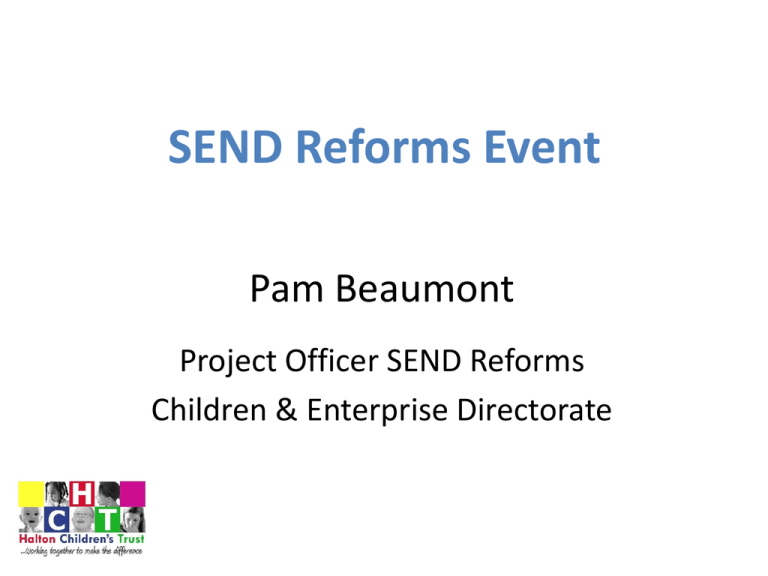
SEND Reforms Event Pam Beaumont Project Officer SEND Reforms Children & Enterprise Directorate Aims & Objectives To raise awareness of key legislative changes To understand the implications for specific services To share Halton’s approach for implementing the SEND Reforms To participate in the Journey of the Child case study & share good practice in the Education, Health & Care Plan workshops To demonstrate development of Halton’s Local Offer To understand the changing role of information, advice & guidance services Working Together Advocacy SEND Reforms SEND Reforms Messages KeyKey Messages Participation SEND Legislative Framework Pam Beaumont Project Officer SEND Reforms Children & Enterprise Directorate The current system of SEND support is complicated, expensive and delivers poor outcomes • Parents struggle to find services that should be helping them, battle to get the help their children need and constantly have to repeat their stories • The transition from children’s to adults’ services can be very difficult • LAs spend over £5 billion a year on SEND provision and yet those with special needs are more likely have poor GCSE achievements and are often Not be in Education, Employment or Training or be unemployed • 1 in 5 children are currently identified as having some form of SEND with 2.8% having a more complex need Working with children, young people and their parents/carers Section 19 of the Children and Families Act lays the foundation for working in partnership with children and young people and their parents and carers Local authorities must have regard to: • The views, wishes and feelings of the child, young person and their parents • The importance of allowing them to participate in decisions relating to themselves (or their child) • The importance of providing information to enable active participation in decision-making • The need to support the child, young person and their parents to facilitate development and enable the best possible outcomes - educational or otherwise Children and Families Act Overview • New requirement for LAs, health and care services to commission services jointly for SEN and disability • LAs to publish a clear, transparent ‘local offer’ of services • More streamlined assessment process, co-ordinated across education, health and care • New 0-25 Education, Health and Care Plans for those with more complex needs • New statutory protections for young people aged 16-25 in FE • A new duty on health commissioners to deliver the agreed health elements of EHC plans • The option of a personal budget for families and young people with an EHC plan Legal Framework & Implementation - Children and Families Act 2014 – Royal Assent 13 March 2014 - Regulations laid – spring 2014 - New Special Educational Needs and Disability Code of Practice – final stage of consultation until 6 May https://www.education.gov.uk/consultations/ - LAs, CCGs and education settings prepare for implementation – implementation pack published 8 April https://www.gov.uk/government/publications/implementing-the-0-to-25special-needs-system - SEND Reforms commence from 1 Sept 2014 - Transitional arrangements – phase out LDAs by Sept 2016, statements by April 2018 Key Changes from September 2014 • LAs and CCGs will work together to commission services jointly to secure a better integrated system for 0-25 year olds • Working together to produce a local offer of services, developed with parents and young people • A streamlined assessment process, co-ordinated across education, health and care involving children, young people and their families • A new 0-25 Education, Health and Care Plan to replace the current system of Statements and Learning Difficulty Assessments • A phased transition for those already with Statements and Learning Difficulty Assessments, taking place over time For Local Authorities What: By September 2014, all LAs will need to have: • Established local partnerships with children, young people and parents and education, health and social care. • Developed plans for joint commissioning across education, health and care services, 0-25; • Published the local offer, fully involving parents and young people; • Developed processes for co-ordinated assessment, planning and EHC plans; • Set out a co-produced local policy for personal budgets; • Planned provision of local information, advice and support (with users) • Reviewed and developed local mediation and disagreement resolution arrangements EHC Assessment and Plans Overview EHC plans will be statutory documents, and will have legal force on education and health support. The co-ordinated assessment and EHC planning process should: • Promote a “tell us once” approach to sharing information wherever possible • Put children, families and young people at the centre of the process • Have effective co-ordination between education, health and care services, with joint agreement on key outcomes • Include consideration of a step down process for children/young people who do not have plan following assessment or who do not meet the criteria for an assessment • Have a maximum 20 week assessment and planning process from initial request to issuing the final plan EHC plans should be: • Clear, concise, readable and accessible to parents, children, young people and practitioners • Specific about special educational needs, outcomes, health and care provision needed, with clearly identified sections • Supportive of preparation for key transition points • Portable In Greenwich, families are setting up password-protected websites personalised with music, short films and written reports to bring their EHCPs to life. Professionals regularly post video clips and other information to keep the plan up to date. Local Offer Overview What: LAs and CCGs must work together to set out in one place information about provision they expect to be available for children and young people in their area who have SEND, including those who do not have EHC plans. How it helps: • Children young people and their parents and carers can shape the local offer – LAs must consult on it and publish what they have done in response to that consultation; • The local offer will make it much easier for children, young people and their parents to navigate the support available, drawing on information, advice and guidance and key worker support; • Through the Code of Practice we are updating the four areas of need. For Early Years settings What: Early Years providers are required to: • follow the standards set out in the Early Years Foundation Stage framework, which includes supporting children with SEND • they are no longer required to record on early years action / early years action plus • work in partnership with parents/carers to develop a plan of support • admit a child, where the nursery is named in their EHC plan • co-operate with the local authority in developing the local offer • have a member of staff to act as SENCO • Have regard to the new 0-25 SEND Code of Practice http://www.4children.org.uk/ For Schools What: The main legal duties on schools will not change, but the way you meet these duties will. Schools must: • use their ‘best endeavours’ to meet pupils’ SEND. Schools no longer have to record pupils as ‘school action’ or ‘school action plus’ • inform parents when pupils receive support for special educational needs and involve them in reviews of progress • admit a young person, where the school is named in an EHC plan • co-operate with the local authority in developing the local offer • appoint a suitably qualified or experienced member of staff as SENCO (National Award) • have regard to the new 0-25 SEND Code of Practice www.nasen.org.uk SEN Support in Schools What: SEN Support replaces School Action and School Action Plus in the Code of Practice: • Legal SEN definitions and duties remains the same • A clear process for identification and assessment, objective setting and reviewing progress • It focuses on Quality-first teaching as foundation • Focused on impact rather than input and categorising pupils • Challenges schools to improve the quality of teaching and learning for all pupils For Post-16 settings What: Further Education colleges, Sixth Form colleges and approved Independent Specialist Providers will be under new legal duties from September 2014, which extend comparable rights and protections for young people aged 16-25 in further education as to those found for children/their parents in school. The key new duties are: • to use ‘best endeavours’ for all young people (up to the age of 25) with SEND, regardless of whether or not they have an EHC plan • to admit a young person, where the college is named in their EHC plan • to co-operate with the local authority, and for them to co-operate in return • to have regard to the new 0-25 SEND Code of Practice http://www.preparingforadulthood.org.uk/ Preparing for Adulthood • A single system from 0-25 for EHC plans, removing the current ‘cliff edge’ at 16; • Focus on outcomes and preparing for adulthood – employment, health, independent living and community inclusion • Local authorities to involve training providers when reviewing their special educational provision and developing their local offer • Role for local authorities in commissioning post-16 provision, to deliver outcomes for young people, including supported internships, study programmes and specialist provision • Young people with EHC plans can remain in the SEN system between age 19 and 25, where the extra time will allow them to consolidate their learning For Clinical Commissioning Groups What: From September 2014 CCGs must work with LAs to: • commission services jointly for 0-25 year old children and young people with disabilities and SEN, including those with Education Health and Care plans • ensure that procedures are in place to agree a plan of action to secure provision which meets a child or young person’s reasonable health need in every case • work with the local authority to contribute to the local offer • ensure that mechanisms are in place to ensure practitioners and clinicians will support the integrated Education Health and Care Assessment within a 20 week maximum • agree personal budgets under section 49 For Social Care What: From September 2014, local authority social care teams will be required to cooperate with local authority SEND teams and others in: • A co-ordinated assessment process leading to an outcomes focused Education, Health and Care (EHC) Plan • Preparing a local offer setting out how parents and young people can access services across education, health and social care LAs should also consider the crucial role that short breaks can play in supporting families Personal Budgets What: As part of their local offer, local authorities should set out a co-produced local policy for personal budgets. How • Identify and agree the funding streams and services for inclusion from September 2014 and develop the necessary infrastructure • Identify and establish the information advice and support necessary at an area and individual level to help families consider options for, and to take-up and manage, personal budgets • Develop a pathway for personal budgets within the EHC assessment and planning process • Identify how the new joint commissioning strategies will support greater choice and control beyond September 2014 • Maintain the core principles in the Code of Practice at all times, ensuring children, young people and families are involved in the decision making processes at both an individual and strategic level In Hartlepool, personal budgets are being been used to fund work placements. Claire hopes to work with animals in the future and is using her personal budget to fund a 10 week placement at a local charity with a small animal farm. The LA helped Claire and her mum negotiate terms and Claire is now using the personal budget to pay for support from a member of staff from the charity, at a cost of £15 per hour. Managing the Transition From 1 September 2014: • no new assessments for statements or Learning Difficulty Assessments (LDAs) will be offered by local authorities • children and young people with existing statements transfer to the new system within three and a half years; and young people with existing LDAs transfer within two years • transfer will happen through a ‘transition review’ and local authorities must have regard to the principles set out in the revised 0-25 SEND Code of Practice when writing new EHC plans • local authorities must work with children and young people with SEND and their parents to agree how transfer from statements over the proposed three and a half year period will be phased • to ensure broadly comparable local plans, national parameters will be established to guide the transfer What children and young people with SEN and disabilities want Parents said: • Engage with us every step of the way • Be honest, even with the difficult bits • Be clear this isn’t an excuse for cutting services • Ask for our help • Help us understand the cultural change Young people said: • Listen to the needs and aspirations of young people • Young people should be allowed to meet without parents so they can talk without being influenced For Further Information Visit the pathfinder website at www.SENDpathfinder.co.uk to see: • Latest information packs from the pathfinders, including case studies, video clips and links to useful materials • Pathfinder evaluation reports • Information about the Delivery Partners who are supporting the reforms and can offer help and advice Download the Council for Disabled Children’s (CDC’s) resources: www.councilfordisabledchildren.org.uk/sendreforminfosheet For regular updates, sign up to receive CDC’s e-bulletin by e-mailing cdc@ncb.org.uk Access the Preparing for Adulthood support materials: http://www.preparingforadulthood.org.uk/ Myth Busters Debbie Houghton, Principal Policy Officer Tracy Ryan, Policy Officer Pam Beaumont, Project Officer SEND Reforms Children & Enterprise Directorate Myth Busters For the following statements, decide which is true and make your selection Options are • 1 – Statement A • 2 – Statement B A: Statements will continue to be issued until September 2014 B: Local authorities can now issue EHC Plans which are legally binding 100% A. A B. B 0% A. B. Myth: ‘My school has said they don’t issue statements any more as the system has changed’ Statements will continue to be issued until 1st September 2014. Some local authorities (on the ‘Pathfinder’ programme) are issuing EHC plans early in place of Statements, but these will have no legal status. After September only EHC plans will be issued and be legally binding. A: All statements must be transferred to EHC Plans from 1st September 2014 B: There is a three year transitional period to transfer existing statements to EHC Plans where appropriate 100% A. A B. B 0% A. B. Myth: ‘My child’s statement will end on 1st September 2014’ From September 2014 there will be a transitional period (up to 3 years) during which statements can be transferred to EHC plans. A statement will remain valid until an EHC plan has been developed, or is agreed to be no longer necessary. A: The Local Offer will set out what a school can offer for SEND from within its budget B: The Local Offer does not include schools provision, this must be set out separately 100% A. A B. B 0% A. B. Myth: ‘My LA has said that only pupils with statements who receive a certain level of funding will get an EHC plan’ The threshold for EHC plans will be the same as those for Statements, that is where the special educational provision necessary to meet the child or young person’s needs cannot be reasonably provided within the resources normally available to mainstream schools and early years settings. A: Any child being assessed under the new system must have a social care assessment as well as an educational needs assessment B: The duty to assess a child’s needs is only in relation to their educational needs 100% A. A B. B 0% A. B. Myth: ‘When I ask for my child to be assessed under the new system the LA must carry out a social care assessment now as well as an assessment of their educational needs’ No this is not true. The duty to assess a child’s needs is only in relation to their educational needs, not any social care needs. This type of assessment still has to be triggered separately by contacting your Children’s Social Care team. Once this has happened, any information should be recorded in the EHC plan. A: An Education, Health and Care plan will continue only for young people who choose to stay in education or training B: ALL young people who have the new Education, Health and Care plans will have a plan until they are 25 100% A. A B. B 0% A. B. Myth: ‘I’ve been told the EHC plans are the same as statements and have the same legal duties’ EHC plans will have no legal force until 1st September 2014. Like statements, any Special Educational Provision in the plan will have to be delivered by the local authority and can continue until the age of 25 if a young person stays in education or training. All parents and young people with an EHC Plan will be able to access direct payments. 100% A. True B. False 0% A. B. Answer - FALSE All parents and young people will be able to request a personal budget where an EHC plan is in place. A personal budget is an amount identified by the local authority as being available to secure particular provision that is specified, or proposed to be specified, in the EHC plan Once identified parents and young people can then request that some or all aspects of the personal budget be converted into a direct payment, but the local authority, and the education provider where relevant, must agree to this and have significant discretion about what they agree to Fewer children and young people will get an Education, Health and Care plan than get a statement of special educational needs? 100% A. True B. False 0% A. B. Answer - FALSE The legal criteria for an Education, Health and Care plan will be the same as the current criteria for a statement If a child currently has a Statement of SEN, unless there is evidence that their needs have changed, they should be entitled to an EHC plan After a child turns 16 a parent cannot be involved in decisions about their child’s support? 100% A. True B. False 0% A. B. Answer - FALSE Young people can continue to have their parents as involved as much as they want. The difference is, when a person with an Education, Health and Care plan turns 16 years old, they have the final say (subject to a young person’s mental capacity) A parent will not automatically be involved in the process. E.g. the right of appeal to challenge an LA’s decision to the SEND Tribunal will be the young person’s no longer the parents Tea/Coffee Break (15 mins) Education, Health & Care Plan Workshop Eileen O’Brien, Specialist Teacher Enhanced Provision Children & Enterprise Directorate “Working Document” – under development Halton’s Template Education, Health & Care Plan “Ben’s Plan” Discussion Questions - table facilitator will record your views/comments: 1. Does this Plan give you a picture of the child and the family overall? What role can a school/setting/Training Provider play in making sure that a family tells its story just once? 2. Does the Plan give you a picture of the child’s needs overall ? 3. Is there any other information or aspect that you feel should be covered? 4. Do you feel that the aspirations of the child have been made clear? 5. Is the voice of the child clear and how else might it be recorded? 6. Are the Outcomes clearly expressed & are they sufficient? 7. Are the actions being proposed to enable the objectives to be achieved specific and quantified? 8. Would this be a working document that would enable a school/setting to develop an Additional Support Plan? 9. Please make any further comments with regard to the working document and the proposed process LOCAL OFFER Debbie Houghton Principal Policy Officer Children & Enterprise Directorate Halton’s Local Offer • The Local Offer describes Education, Health and Social Care provision for children and young people, 0-25 • Information is clear, comprehensive and accessible • Not just a directory - responsive to local needs, involving CYP and parents in development and review • A feedback mechanism is to be incorporated so that gaps/ concerns are identified Vision for the Local Offer • Parents know what they can reasonably expect their local school, college, LA and other services to provide • Schools are clear about the universal offer to pupils with SEND and what targeted and specialist services are available in school and in the locality • Aspirations for young people are raised by focusing on improving progress and outcomes • Greater involvement of parents and young people giving some control over the services provided • Services are commissioned and provided in a coherent way by health, education and social care Local Offer and Schools • The Local Offer will set out what a typical school can offer for SEND from within its budget • Schools must be involved (as providers) in the development of the Local Offer Local Offer will include how schools: • Identify and assess SEND and adopt early intervention and prevention measures • Will provide a graduated response to children’s SEND • Adapt teaching and the curriculum • Make adjustments to the learning environment to assist access for disabled pupils • Assess the impact of interventions and assess progress: Assess, Plan, Do, Review Local Offer will include how schools (cont): • • • • • • • • Support transition Prepare for adulthood Develop staff re: SEND Demonstrate high expectations for all pupils Support access to extra curricular activities Support and involve parents and carers Work in partnership with other professionals Work with Ofsted to look at how pupils with SEND are making progress and gaps in achievement • Are required to publish detailed information on the Local Offer for their particular school Murdishaw West Local Offer www.haltonchildrenstrust.co.uk Where can I find out more? Visit the pathfinder website at www.SENDpathfinder.co.uk to see: • Download the Council for Disabled Children’s (CDC’s) resources: www.councilfordisabledchildren.org.uk/sendreforminfosheet • For regular updates, sign up to receive CDC’s e-bulletin by emailing cdc@ncb.org.uk • Access the Preparing for Adulthood support materials: • http://www.preparingforadulthood.org.uk/ • DfE www.education.gov.uk • Full range of documents can be found at:www.gov.uk • Organisation in UK for special needs information http://www.nasen.org.uk/ Halton SENDIAS (Halton Parent Partnership) Sharon Spruce Officer/Co-ordinator Children & Enterprise Directorate The one clear message so far today….. There is a clear duty to ensure that children, young people and parents/carers are always participating as fully as possible, and that they are consulted and given the information, advice and guidance required at each stage. Participation - who says so? Children and Families Act 2014 (“the act”) - Section 19 • a) the views wishes and feelings of the child and his or her parent, or the young person • b) the importance of the child and his or her parent, or the young person, participating as fully as possible in decisions • c) the importance of the child and his or her parent, or the young person, being provided with the information and support necessary to enable participation in those decisions • d) the need to support the child and his or her parent, or the young person, in order to facilitate the development of the child or young person and to help him or her achieve the best possible educational and other outcomes The act is designed to give parents, children and young people greater choice and control over their support • The SEN and Disability regulations 2014 • The Special Educational Needs (personal budget) regulations 2014 • Case law (past cases which clarify understanding of law) • Guidance – The SEN and Disability code of practice (draft April 2014) All in it together SEND – It is EVERYONES business Participation in Halton PARENT VOICE “ It should be like going on a journey together” “ I don’t want to just know when it’s started to go REALLY wrong” “I want to be valued but not overpowered” “It should start way before school things …..” Participation in Halton Michelle Forder Children’s Trust Lead Engagement Officer Children & Enterprise Directorate INVOLVE GROUP What do we mean by participation? Participation is not just about asking questions and it is certainly not about ticking boxes – it is about an embedded process between children, young people and decision makers; who consistently work together to improve services and provision. It is about a culture of respect, involvement; and change, where everyone’s views are important. Every child and young person is a member of society. Organisations provide services for people living in that community or society so it’s important that they are involved in the provision of services. Parents, carers and families also play a vital part in the development and delivery of services. This will ensure that a service is developed reflecting local needs and hopes and supports families to access the service. In Halton we will seek to work around the lives of children, young people and their families, whatever their background, circumstances and abilities. Halton Children’s Trust recognises that all children, young people, parents and carers are experts in their own lives, and have a good contribution to make. Participation and the SEND Reforms c) the importance of the child and his or her parent, or the young person, being provided with the information and support necessary to enable participation in those decisions C & F Act: Section 32 – Advice & Information SEND Code of Practice - April 2014 Draft EXPECTATION …… All Parent Partnership services will develop to meet these requirements FROM 1ST SEPTEMBER 2014 No longer Halton Parent Partnership Special Educational Needs and Disability Impartial Advice Service In addition to SENDIAS services: INDEPENDENT SUPPORTERS (IS) • A 2 year programme to provide additional support to young people and parents during the implementation of the SEND reforms • Independent Supporters will work directly with young people and the parents of children being assessed for an EHC plan, also those who are converting from statement or LDA to plan. • Government funded, time limited (2years, and mostly within the 20 week EHC plan time frame) • Each local area will have supporters as an additional resource • Overseen by the Council for Disabled Children • Majority of IS based in private , voluntary and community sector Lunch & Networking SEND Reforms Key Messages Gerald Meehan Strategic Director – Children and Enterprise What we want to achieve We want children and young people with special needs and disabilities to: • Have high aspirations; • Achieve well in their early years, at school and college, and transition smoothly into adult life; • Find meaningful employment; • Lead happy and fulfilled lives; • Have choice and control over the support they receive. What is Changing? The SEND Reforms: putting children & young people at the centre Where disagreements happen, they can be resolved early and amicably, with the option of a Tribunal for those that need it Enablers Joint commissioning Better disagreement resolution processes Local offer Outcomes Having friends Positive Wellbeing views heard Option of a Personal Budget Employment prospects 0-25 Children and young people with SEND and families Making their Extending choice and control over their support Children, young people and parents understand a joined up system, designed around their needs Information, advice and support Good qualifications Integrated assessment and planning Education Health and Care Plan is holistic, co-produced, focused on outcomes, and is delivered Start of a Journey • 1-2% young people with most complex needs will require an EHC Plan • Early Help is key • High Quality Teaching • Robust School Offer • Engagement from parents, carers and young people • Diverse range of services in place ‘Recognise the important work schools do with all young people not just around SEND’ Thank You for your support Journey of the Child Case Study Workshop Pam Beaumont Project Officer SEND Reforms Children & Enterprise Directorate Case Studies Exercise Case Study 1 Does the fact that Ben is experiencing some language difficulties / difficult behaviour mean that Ben has a special educational need? 100% A. Yes B. No 0% A. B. Would Ben need an EHC Plan? 100% A. Yes B. No 0% A. B. Case Study 2 What are the outcomes and why are they at the heart of the SEND Reforms? 100% A. B. C. D. E. The aim of the legislation is to improve life chances and outcomes for all those with SEND, enabling all to have high aspirations. They naturally link to the achievement of longer-term aspirations as a young person goes through various transition points and prepares for adulthood. Defined as a benefit or difference made to an individual as a result of an intervention Aspirations include an opportunity to have a job and live independently. All of the above. 0% A. 0% 0% B. C. 0% D. E. Case Study 3 Which of the following are steps in developing an EHC Plan? 100% A. School gathers all of the information, consults with young person and family about options B. School considers that all aspects of the universal offer have been accessed C. School ensures that the necessary parental consents have been completed D. All of the above E. A and C only 0% A. 0% 0% B. C. 0% D. E. Case Study 4 Would Ben find it possible to have a Personal Budget as an adult? 100% A. Yes B. No 0% A. B. Case Study 5 The Special Educational Needs & Disabilities Tribunal (SENDIST) can look at all aspects of the EHC Plan if there is an Appeal by Ben? A. Yes B. No 0% A. 0% B. Training Requirements Pam Beaumont Project Officer SEND Reforms Children & Enterprise Directorate Panel Questions Session
